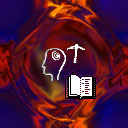But somehow I just couldn't stop making web pages, an ailment known as Webmaster's Disease, HTMLITIS, Uploader's Cramp, and sometimes Carpel Tunnel Syndrome. I ran out of my own stuff quicker than I could say "I'm no Tolstoy," so I started looking for other authors with the same simple desire common to our craft: the desire to be published.
That lead me to an unexpected question: who deserves to be published? After some consideration I realized that the answer to that question was precisely what the web is all about. Writing, and all of art, is subjective, and it depends on the audience how it is received. On the web you can encounter anything, and well you should, because you are the judge, not editors, financial backers, promoters, or owners. Surf like a madperson and DECIDE what you like.
Therefore Ethic #1 of the Mind Mined Public Library is that
1) Everyone has the right to be published
After all, publishing is only "making public"... so if you're ready to communicate, go for it. The hate mail could only be interesting.
Though future legal decisions may disagree, I hold that authors, not webmasters, are responsible for what they write, so I try not to turn authors away from this page because of my own fears, biases, or tastes. Getting people's work up on the web isn't the same as agreeing with the work itself... the endorsement is of the author's right to go public at all. Yes, Mind Mined provides for that basic right... and there might be a line or two in the Constitution about it, also.
Ethic #2 of the Mind Mined Public Library is that
2) Trees are living and hardcopy is dead
One major positive impact computers could have on the environment is the elimination of the need for wood pulp. Though computer monitors still don't make for enjoyable long-term reading, soon they will, and our need for a hardcopy of anything on paper will be in the past. This is obviously excellent news for our valued tree populations, and our oxygen supply for that matter. Encouraging people to read and communicate on the web may very well solve one of our major environmental problems.
3) Digitization of Thought is Preservation of Thought
When a piece of writing, music, or art is transformed into something a computer can interpret, it suddenly stands a much greater chance of "living on." Modern prophets are hailing computers as the possible key to immortality, and we can already see analogies to this in technology's emerging forms. A webpage uploaded to a server on the internet may remain there long after the author passes away. And it may also exist in hundreds or thousands of downloaded files on home computers or other networked storage spaces.
Most authors' books decompose at a rate only slightly slower than the authors' bodies themselves, because the writers did not grab the immediate attention of their contemporaries. But history has proven that the immediate attention of contemporaries is not always the best criterion by which to judge art.
Therefore Mind Mined facilitates the publishing and mirroring of all works, whether they exist in hardcopy in some form, "live" elsewhere on the web, or were just pulled from somebody's bottom drawer. We only have a limited number of thoughts to think in a lifetime, and insomuch as they have been written down we are best served by making them available to public record. In this way we will eventually have a database of human thought which will dwarf any physical library of the present day.
And hopefully this will be joined by a database of opinion (and votes) which will make American representative democracy obsolete. The notion that representative democracy is true democracy is perhaps the largest propagandized sham in the history of the New World.
Did I digress?
Hope you do, too. Send it here.
Best wishes,





